 A Painful Realization and a Gift
A Painful Realization and a Gift
Recently I was listening to a religious leader speak at a conference. As he talked, it came clearly into my mind that I had a weakness I had never supposed. I was shocked to see myself in this new light. In the past, I would have immediately begun beating myself up for having a weakness. But not today. I have learned a great lesson over the years that has helped me look upon a newfound weakness as a gift.
I have learned that when we recognize a weakness, it is a gift because only then can we do something about it. Only then can we change a behavior, a story we tell ourselves, or a way of being. The weakness I discovered during the conference I attended was unknown to me. There wasn’t any way that I could do anything about it. Now I am pondering it and coming up with a plan to turn it into a strength—what a magnificent gift.
In my spiritual cannon, there is a verse that I cling to when I am working on a weakness, and it is challenging me. “And if men come unto me, I will show unto them their weakness. I give unto men weakness that they may be humble, and my grace is sufficient for all men that humble themselves before me; for if they humble themselves before me, and have faith in me, then will I make weak things become strong unto them.” Ether 12:27
Isn’t that an excellent thought, that God shows us where we are weak, where we need to do some work because he loves us and wants to help us become stronger in that area?
I have often said that our weaknesses are our strengths in embryo. Inside an egg, the embryo doesn’t look like much, but eventually, it becomes a bird and beatifies the world. A seed isn’t very exciting and even when it emerges from the ground it isn’t anything to look at. It takes time for a flower or a tree to grow.
Strengths are Often Disguised as Weakness
We are like that. Our greatest strengths may not be apparent to us yet, but they are there, and often they are disguised as a weakness. So when you come face to face with a weakness – yelling, lack of focus, difficulty getting your family systems to work, being discouraged, feeling overwhelmed, feeling resentment, and a host of others, celebrate. Celebrate God’s greatness in showing you what to do to be happier and grow as a person.
It isn’t always easy. Once I realized that yelling wasn’t the best way to deal with my family, it took me ten years to conquer it. What if I had given up on myself after five years or eight or nine. A couple of years ago, I began anticipating the coming of the New Year. In September, I felt an urgent need to make changes in my way of being and in my life. I didn’t want to enter the New Year in limbo. I wanted to know what one thing I could do to affect the most significant personal growth. I was serious. It wasn’t a passing fancy motivated by a current problem. I wanted my life to feel different, better. I wanted to be better.
I set out to discover the one thing I could work on to take me where I desired to go. I approached the problem in the same way I approach most things: I began seriously pondering and praying. The simple steps I took were to think diligently on the issue and to pray daily. I repeated this process for over three months. Finally, eureka, I struck gold. In December, a thought came clearly to my mind—Stop complaining. I hadn’t considered myself a complaining person, so this was a bit of a shock. Nevertheless, I began monitoring my words, thoughts, and actions over the next few weeks. I could see I had indeed struck gold.
It’s been a few years, and I’m still working on this. It’s a toughie! But the changes I’ve experienced have been astonishing. I’ve grown in areas I didn’t realize my complaining was affecting. I am happier, I feel more successful as a person, my relationships are changing. It has been worth the work, and the knowledge of this weakness has, indeed, been a gift.
Moving Forward When You Discover a Weakness
•When you see a current weakness in yourself, accept that it’s about you and not others’ behavior. Take responsibility.
•Think honestly about the weakness, and then determine small steps to begin making a change.
•Make certain the actions you take are in your control.
•Write the weakness down and then write down the opposite, so you see the weakness in a new light, as your emerging strength.
A friend of mine, April H. has experienced this. She told me, “I’m so grateful you shared with me that I’m the opposite of my weaknesses. This truth has changed how I see my stumbling blocks and how I see and handle both of my sons as well.”
Remember, a weakness is a strength in embryo. When you discover another weakness, celebrate the gift you have been given and then go to work. You will grow, and over time, you will be happier.







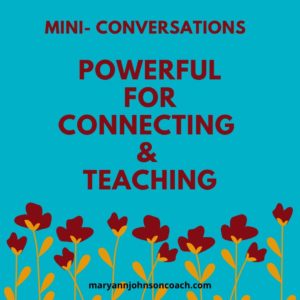 Since the schools closed,
Since the schools closed, 
 It has been three weeks, and you haven’t heard from me.
It has been three weeks, and you haven’t heard from me.
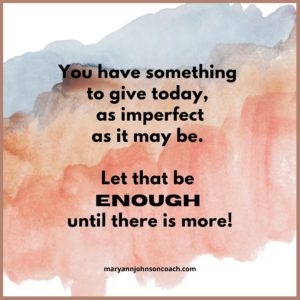
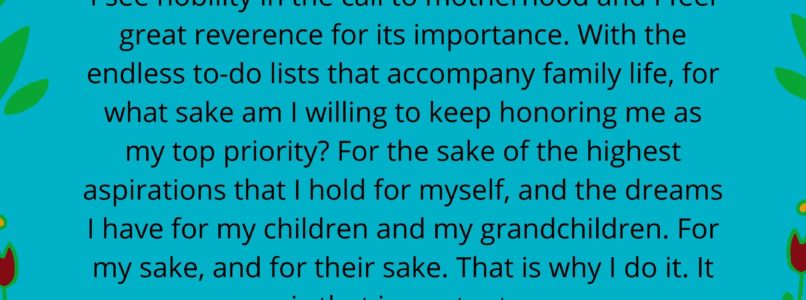
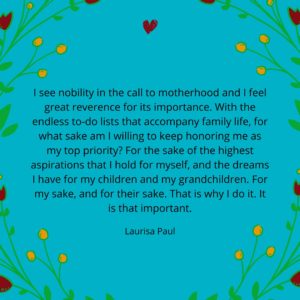



 contained pictures of what I wanted to happen in my life. She must have thought about that for a few days and then she came and asked me to help her make one. She also noticed that I made my bed every morning, and soon she began doing the same. She was only eight or nine, and nobody told her to do it. She saw that I did it and that it was a good thing. She also saw the sayings and affirmations that I have on my walls. If you go into her room, you will notice that she has hopeful and joyful sayings all over the place. When she makes anything or buys anything, she makes sure that the words she loves are on it.
contained pictures of what I wanted to happen in my life. She must have thought about that for a few days and then she came and asked me to help her make one. She also noticed that I made my bed every morning, and soon she began doing the same. She was only eight or nine, and nobody told her to do it. She saw that I did it and that it was a good thing. She also saw the sayings and affirmations that I have on my walls. If you go into her room, you will notice that she has hopeful and joyful sayings all over the place. When she makes anything or buys anything, she makes sure that the words she loves are on it. One day, about a year ago, she said, “Grandma, you and I am the same.” You know she is right. I work to remain in
One day, about a year ago, she said, “Grandma, you and I am the same.” You know she is right. I work to remain in 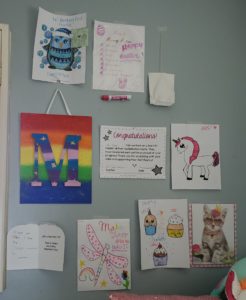 Our example to our children matters. If we feel like victims and live our lives as if we are, our children will see that and follow suit. If we blame and criticize, so will our kids. If we talk poorly to ourselves, then how can our children believe that they are any better. We can’t and won’t be perfect people or parents, but what will last and impact our children the most is when they see us growing. There is power in understanding and believing that you are 100% in control of your life. You may not be able to control all the circumstances, but
Our example to our children matters. If we feel like victims and live our lives as if we are, our children will see that and follow suit. If we blame and criticize, so will our kids. If we talk poorly to ourselves, then how can our children believe that they are any better. We can’t and won’t be perfect people or parents, but what will last and impact our children the most is when they see us growing. There is power in understanding and believing that you are 100% in control of your life. You may not be able to control all the circumstances, but 


 Congratulations on creating your family mission statement! However, for it to translate into a family culture, you must now use it. Here are some ideas to engage with your family mission statement in meaningful ways.
Congratulations on creating your family mission statement! However, for it to translate into a family culture, you must now use it. Here are some ideas to engage with your family mission statement in meaningful ways.
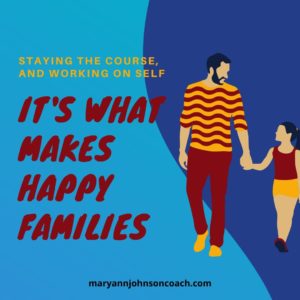 As I was raising our children, I made many mistakes. I was not gentle enough. I was a yeller. Sometimes I did not listen. I could be stern.
As I was raising our children, I made many mistakes. I was not gentle enough. I was a yeller. Sometimes I did not listen. I could be stern.